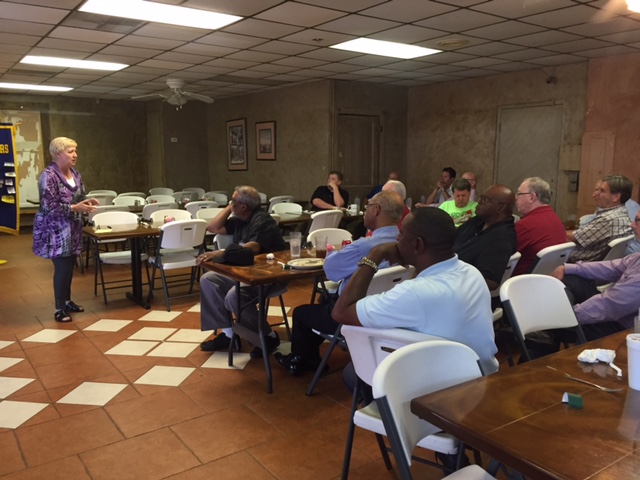HOPE – Author Thomas Wolfe is famously credited with writing that “You can’t go home, again;” but, Hope Academy of Public Service Principal Dr. Carol Ann Duke accepted the challenge of that idea to help foster a new concept in education in Hope.
“Children of the 21st Century need a different approach and this campus is striving to do that,” Dr. Duke said in an interview.
She began her career in education as a ninth-grade English teacher at Yerger Junior High School in Hope in 1992, and Duke comes to Hope by way of Texarkana and Magnolia. She is firmly committed to the idea that starting a new school campus from scratch is necessary, noting that the curriculum at HAPS will drive its future.
“That will give them the ability to explore the skills they want to develop, or already have,” Duke said.
She is excited by the notion that HAPS has been developed with the specific goal of “educating life scholars,” as its motto reflects. Duke said such concepts as developing college ready skills in students by the 10th grade to allow them to graduate from high school and hold an associate’s degree from the University of Arkansas Hope-Texarkana at the same time have historically been unheard of in public education in South Arkansas.
“And, if it happened south of Interstate 30, it doesn’t get much notice,” Duke remarked.
Consequently, Duke is approaching the culture of HAPS with a rebuttal to Thomas Wolfe in mind; that students can graduate from the Hope Public Schools, go to college and return to Hope to contribute to its future.
“I’ve done it several times,” she said.
She comes to Hope from the Southern Regional Education Board, where she was involved in literacy effectiveness development for schools across multiple states since 2012. Prior to that time, Duke was the director of High Schools That Work and the Technology Centers for the Texarkana Area Vocational Center of the Texarkana School District from 2002.
“My first career was psychological counselor in a mental health facility in Texarkana,” she said.
She has a total of 24 years of full-time experience in public education in the Texarkana Public Schools, Nevada County School District, Taylor School District, and the Hope Public Schools, as well as teaching as an adjunct faculty member and director of institutional development at Southern Arkansas University Tech in Camden and as an adjunct professor at SAU in Magnolia.
Duke admits that she was sold on the principal’s job by the convergence of opportunities it affords.
“It was really about a perfect storm of being able in the confines of public education to turn things on their head,” she said.
Duke outlined much of the vision for HAPS and her attraction to the concept in a recent report to the Hope Kiwanis Club.
“Part of the schedule for students will revolve around an advisory session,” she said. “This is spent discussing their career and college aspirations, and making sure they are ready.”
HAPS has been developed to change the education model in Hope.
“We all know that public schools have met the needs well, but with today’s generation we have to meet them in a different way,” Duke said. “From the moment the students and staff step into our building, it’s not going to look or feel like any other building in the district. Students are going to be immersed in technology all day long; technology with a purpose.
“Teachers are going to spend a lot of time front-loading lesson plans, and then students take charge for their own instructional day, and teachers become facilitators,” she added.
Students will also become involved in community-based service projects through partnerships with higher education and civic and other organizations, Duke said.
“Part of what will take place at our campus is that one Saturday a month, students, parents and staff will be involved in some sort of public service,” she said. “Sometimes, it will be involved in getting students prepared for college, but most of the time it will be community service related.”
It is that aspect of HAPS that attracted Duke from a professional perspective after 25 years in public education dealing with college and career preparation.
“That is where civic organizations come into play,” she said. “Civic organizations and stakeholders in the community are going to be called upon to share with our children the pathways that are going to become available to them to have careers that don’t necessarily come to mind when you think about doing a job in Southwest Arkansas.
“Now that we can telecommute, and do those kinds of things, you’re not bound by a brick and mortar job,” Duke explained.
Acceptance letters for the first 157 students at HAPS were mailed Wednesday.
“After you receive that letter, you have until June 16 to accept that invitation from us; then, you will come to school and we will go through the student compact and the parent compact for each student on our campus,” Duke said.
Once enrollment is completed, classes will begin on Aug. 15.
A unique aspect of the HAPS model will be its connection with the William Jefferson Clinton School of Public Service in Little Rock, Duke said.
“Part of the graduate program at the Clinton School of Public Service is that over two college courses, students have to do 300 hours of field placement,” she said. “That means they come into a community and set up a program or a project utilizing students in a community.”
The HAPS campus has been identified as a likely field project campus, Duke said.
“We feel that, if not in the fall semester, then in the spring semester, students that are in a practicum situation at the Clinton school may be assigned to come here and do part of their practicum,” she said. “If they have students who are from this region of the state, they will try to assign them here, so that it’s not a hindrance for them to travel back and forth.”
Duke is committed to the academic goal that underlies the HAPS model.
“When they leave us in the ninth grade, if they are not at a 19 on the ACT or 83 on Compass, they will be knocking on that door, and they are there by the end of their ninth grade year,” she said.

